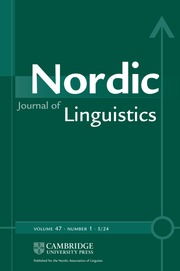Crossref Citations
This article has been cited by the following publications. This list is generated based on data provided by
Crossref.
Holmqvist, Kenneth
and
Płuciennik, Jarosław
1996.
Conceptualized Deviations from Expected Normality: A Semantic Comparison Between Lexical Items Ending in -ful and -less.
Nordic Journal of Linguistics,
Vol. 19,
Issue. 1,
p.
3.
Balkenius, Christian
and
Winter, Simon
1999.
Understanding Representation in the Cognitive Sciences.
p.
199.
Bellahsène, Linda
2007.
Représentation du sens linguistique II.
p.
253.
Chilton, Paul
2010.
The conceptual structure of deontic meaning: A model based on geometrical principles.
Language and Cognition,
Vol. 2,
Issue. 2,
p.
191.
Lizardo, Omar
2013.
Schmaus’s Functionalist Approach to the Explanation of Social Facts.
Philosophy of the Social Sciences,
Vol. 43,
Issue. 4,
p.
453.
2015.
Discourse, Identity and Legitimacy.
Vol. 62,
Issue. ,
Gärdenfors, Peter
2017.
Knowledge and Action.
Vol. 9,
Issue. ,
p.
203.
Hartman, Jenny
2017.
Premonitory urges and Touretting volcanoes.
Review of Cognitive Linguistics,
Vol. 15,
Issue. 1,
p.
154.
Gärdenfors, Peter
and
Brala-Vukanović, Maja
2018.
Semantic domains of demonstratives and articles: A view of deictic referentiality explored on the paradigm of Croatian demonstratives.
Lingua,
Vol. 201,
Issue. ,
p.
102.
Lyon, Andrew
and
Hunter-Jones, Philippa
2019.
Critical discourse analysis and the questioning of dominant, hegemonic discourses of sustainable tourism in the Waterberg Biosphere Reserve, South Africa.
Journal of Sustainable Tourism,
Vol. 27,
Issue. 7,
p.
974.
Hausner, Jerzy
Możdżeń, Michał
and
Oramus, Marek
2021.
Fragility of Social and Economic Systems and the Role of “Modality”.
Journal of Economic Issues,
Vol. 55,
Issue. 4,
p.
1118.
Hou, Renkui
Huang, Chu-Ren
and
Ahrens, Kathleen
2022.
Regional varieties and diachronic changes in Chinese political discourse.
Humanities and Social Sciences Communications,
Vol. 9,
Issue. 1,
Lenardič, Jakob
and
Pahor de Maiti, Kristina
2023.
Grammatical and Pragmatic Aspects of Slovenian Modality in Socially Unacceptable Facebook Comments.
Slovenščina 2.0: empirical applied and interdisciplinary research,
Vol. 11,
Issue. 1,
p.
33.
Gärdenfors, Peter
2024.
Event structure, force dynamics and verb semantics.
Language Sciences,
Vol. 102,
Issue. ,
p.
101610.


